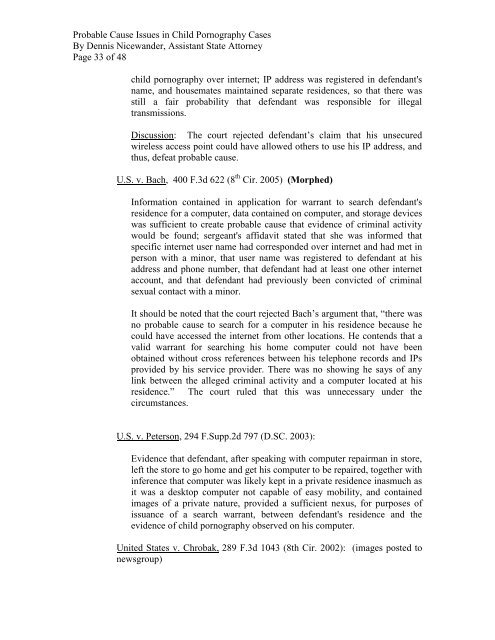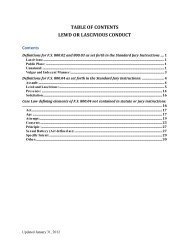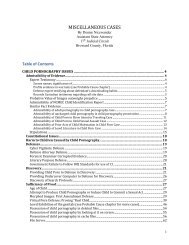Probable Cause Issues in Child Pornography ... - Locatethelaw.org
Probable Cause Issues in Child Pornography ... - Locatethelaw.org
Probable Cause Issues in Child Pornography ... - Locatethelaw.org
You also want an ePaper? Increase the reach of your titles
YUMPU automatically turns print PDFs into web optimized ePapers that Google loves.
<strong>Probable</strong> <strong>Cause</strong> <strong>Issues</strong> <strong>in</strong> <strong>Child</strong> <strong>Pornography</strong> Cases<br />
By Dennis Nicewander, Assistant State Attorney<br />
Page 33 of 48<br />
child pornography over <strong>in</strong>ternet; IP address was registered <strong>in</strong> defendant's<br />
name, and housemates ma<strong>in</strong>ta<strong>in</strong>ed separate residences, so that there was<br />
still a fair probability that defendant was responsible for illegal<br />
transmissions.<br />
Discussion: The court rejected defendant’s claim that his unsecured<br />
wireless access po<strong>in</strong>t could have allowed others to use his IP address, and<br />
thus, defeat probable cause.<br />
U.S. v. Bach, 400 F.3d 622 (8 th Cir. 2005) (Morphed)<br />
Information conta<strong>in</strong>ed <strong>in</strong> application for warrant to search defendant's<br />
residence for a computer, data conta<strong>in</strong>ed on computer, and storage devices<br />
was sufficient to create probable cause that evidence of crim<strong>in</strong>al activity<br />
would be found; sergeant's affidavit stated that she was <strong>in</strong>formed that<br />
specific <strong>in</strong>ternet user name had corresponded over <strong>in</strong>ternet and had met <strong>in</strong><br />
person with a m<strong>in</strong>or, that user name was registered to defendant at his<br />
address and phone number, that defendant had at least one other <strong>in</strong>ternet<br />
account, and that defendant had previously been convicted of crim<strong>in</strong>al<br />
sexual contact with a m<strong>in</strong>or.<br />
It should be noted that the court rejected Bach’s argument that, “there was<br />
no probable cause to search for a computer <strong>in</strong> his residence because he<br />
could have accessed the <strong>in</strong>ternet from other locations. He contends that a<br />
valid warrant for search<strong>in</strong>g his home computer could not have been<br />
obta<strong>in</strong>ed without cross references between his telephone records and IPs<br />
provided by his service provider. There was no show<strong>in</strong>g he says of any<br />
l<strong>in</strong>k between the alleged crim<strong>in</strong>al activity and a computer located at his<br />
residence.” The court ruled that this was unnecessary under the<br />
circumstances.<br />
U.S. v. Peterson, 294 F.Supp.2d 797 (D.SC. 2003):<br />
Evidence that defendant, after speak<strong>in</strong>g with computer repairman <strong>in</strong> store,<br />
left the store to go home and get his computer to be repaired, together with<br />
<strong>in</strong>ference that computer was likely kept <strong>in</strong> a private residence <strong>in</strong>asmuch as<br />
it was a desktop computer not capable of easy mobility, and conta<strong>in</strong>ed<br />
images of a private nature, provided a sufficient nexus, for purposes of<br />
issuance of a search warrant, between defendant's residence and the<br />
evidence of child pornography observed on his computer.<br />
United States v. Chrobak, 289 F.3d 1043 (8th Cir. 2002): (images posted to<br />
newsgroup)





